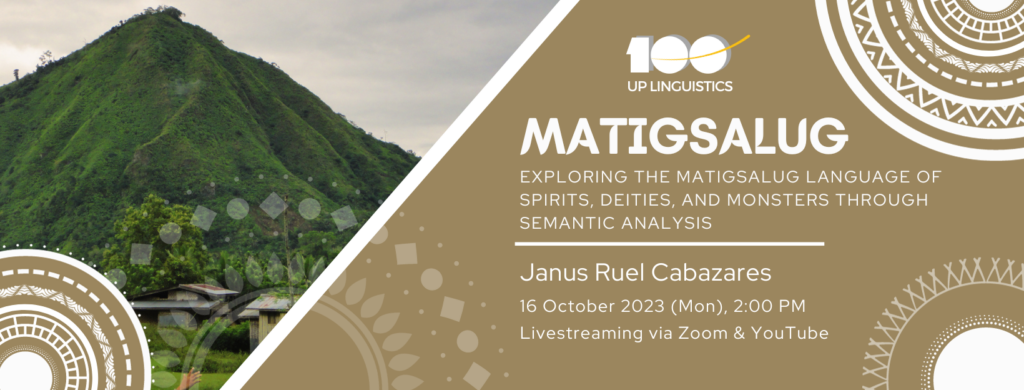Matigsalug | Philippine Indigenous Languages Lecture Series
- Date: 16 Oct 2023 | 2:00 PM - 3:00 PM

Exploring the Matigsalug Language of Spirits, Deities, and Monsters through Semantic Analysis
Philippine Indigenous Languages Lecture Series (PILLS)
16 October 2023 | 2:00 PM | Livestreaming via Zoom & YouTube
The ninth installment of PILLS will feature MA Linguistics alumnus, Asst. Prof. Janus Ruel Cabazares. Cabazares will talk about Matigsalug, a language spoken in several localities in Mindanao.
ABSTRACT:
In the Matigsalug language, several names for spirits including deities and monsters, are used in stories, prayers, and conversations. Names, like nouns, usually refer to entities, and often to individual things. However, for spirit names, this study argues for a cognitive semantic approach to lexical items. Consequently, the relevant question is: what concepts do spirit names evoke?
To look at the semantics of spirit names, this study analyzes noun and verb co-occurrences in sentences which express how spirits act and participate in events. The following two important points are explored: [1] the use of verbs as a frame and the resulting patterns of favored and disfavored collocations enable the identification of semantic features such as the shape they take as entities, the way they are perceived, the actions they perform, and the domains (environmental and behavioral) linked to each. [2] In addition, such sentences describe interactions between humans and spirits. These evoke the following Semantic Frames: SELF MOTION, TRANSFER, ACTION, COMMUNICATIVE ACT, and PERCEPTION. Within these, spirit names serve participant roles according to their semantic features particularly their identified environmental and behavioral domains.
Spirit names evoke concepts centered on human activity, especially its social dimension. This crucial notion points to a conceptualization of spirits within the Matigsalug language as being anchored in social relations including interactions with the environment. Concepts of spirits arise in how particular social interactions and those between the Matigsalug and their environment are realized. This fascinating link between language and culture is borne out by cognitive semantic analysis of lexical items such as spirit names. Furthermore, this approach illuminates a distinctive way to explore spirit names and other related lexical items which interestingly are also found in varying degrees in many other languages.
